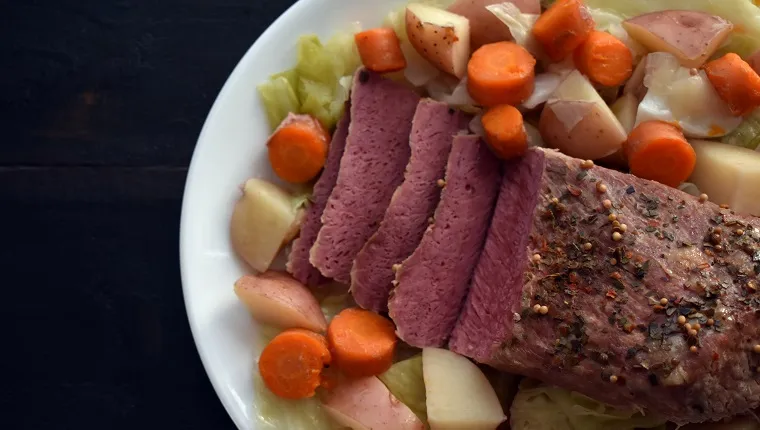Corned beef may seem delicious to us, but what about our canine companions? Let’s delve into whether this savory treat is safe for dogs and what precautions pet owners should take.
What is Corned Beef?
A Brief Introduction to Corned Beef
Corned beef is a type of cured meat typically made from beef brisket, cured with salt and seasoned with various spices. It’s often associated with holidays like St. Patrick’s Day and has a distinct salty flavor.
Nutritional Content of Corned Beef
What Does Corned Beef Contain?
Corned beef is rich in protein, fats, and sodium. It can also contain additives and preservatives depending on the processing methods. Understanding its nutritional profile is crucial when considering it as a part of a dog’s diet.
Can Dogs Eat Corned Beef?
Safety Considerations
While dogs can technically eat corned beef, it’s not recommended as a regular part of their diet. The high salt content and potential additives make it less than ideal for canine consumption. Small amounts on occasion may be okay, but moderation and caution are key.
Potential Risks of Feeding Corned Beef to Dogs
Salt and Sodium Concerns
Corned beef is heavily salted during the curing process. High sodium intake can lead to dehydration, electrolyte imbalances, and even sodium ion poisoning (salt poisoning) in dogs. This is especially risky for smaller breeds and dogs with kidney issues.
Additives and Preservatives
Some commercially available corned beef products may contain additives like nitrites, which can be harmful to dogs if consumed in large quantities. It’s essential to read labels and choose natural, minimally processed options if feeding corned beef.
Health Effects of Corned Beef on Dogs
Digestive Upset
The richness and fat content of corned beef can lead to gastrointestinal issues such as vomiting, diarrhea, or pancreatitis in dogs, especially if they consume large amounts or have sensitive stomachs.
Nutritional Imbalance
Feeding corned beef as a primary source of protein can disrupt a dog’s balanced diet. Dogs require a diet rich in animal protein, but corned beef lacks essential nutrients found in quality dog food, such as vitamins, minerals, and fiber.
Alternatives to Corned Beef for Dogs
Safer Protein Sources
Opt for lean, unseasoned meats like boiled chicken, turkey, or beef without additives. These options provide protein without the high salt content or potential harmful additives found in corned beef.
Homemade Treats
Consider preparing homemade treats using safe ingredients tailored to your dog’s dietary needs. This allows you to control portions, ingredients, and avoid unnecessary additives found in commercial products.
Feeding Guidelines for Corned Beef
Occasional Treats Only
If you choose to give your dog corned beef as an occasional treat, ensure it’s in small amounts and free from excess salt or spices. Monitor your dog for any adverse reactions and consult your veterinarian if you have concerns.
Conclusion: Is Corned Beef Safe for Dogs?
A Balanced Perspective
While corned beef isn’t toxic to dogs in small amounts, it’s not recommended due to its high salt content and potential additives. Opting for healthier protein sources and balanced dog food ensures your furry friend receives the nutrients they need without compromising their health.
Is corned beef safe for dogs to eat?
Corned beef is not recommended as a regular part of a dog’s diet due to its high salt content and potential additives. Occasional small amounts may be safe for some dogs, but moderation and caution are advised.
How safe is corned beef?
Corned beef is safe for human consumption when cooked properly and in moderation. However, its high salt content and additives can pose health risks if consumed excessively.
Is corned beef a good meat to eat?
Corned beef can be a tasty addition to meals, but it’s considered less healthy than fresh, unprocessed meats due to its high sodium and fat content. Moderation is key to enjoying it as part of a balanced diet.
Is corned beef hard to chew?
Corned beef can vary in texture depending on how it’s prepared. It’s typically tender after cooking but can be tough if not cooked properly or sliced thinly.
Can you freeze corned beef?
Yes, corned beef can be frozen to extend its shelf life. Wrap it tightly in freezer-safe packaging or containers to maintain quality. Thaw in the refrigerator before reheating or consuming.
Can corned beef be eaten without cooking?
Corned beef is cured and typically requires cooking before consumption to ensure it’s safe to eat and to achieve the desired texture and flavor.
Does corned beef need to be cooked?
Yes, corned beef needs to be cooked thoroughly to kill bacteria and ensure it’s safe to eat. This is especially important for food safety.
What does corned beef taste like?
Corned beef has a savory, salty flavor with subtle spice undertones from the curing process. It’s rich and hearty, often enjoyed with vegetables like cabbage or potatoes.
Is corned beef high in iron?
Yes, corned beef is relatively high in iron, which is beneficial for maintaining healthy blood and energy levels. However, its high fat and sodium content should be considered when including it in your diet.
Why do people eat corned beef?
People enjoy corned beef for its rich flavor, especially during holidays like St. Patrick’s Day. It’s a traditional dish that’s hearty and satisfying, often paired with vegetables and enjoyed in various culinary preparations.
- Best Lusha Alternatives for 2025 - April 19, 2025
- Best Overloop Alternatives for 2025 - April 19, 2025
- Best Snov.io Alternatives for 2025 - April 18, 2025



